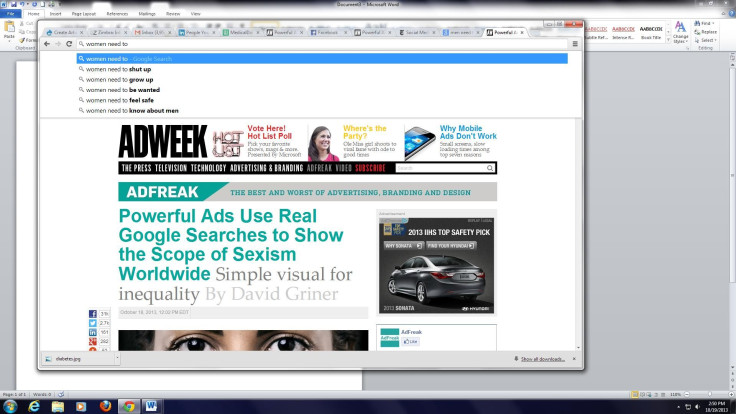A Look At Sexism Around The World, Revealed By Google's Autocomplete Feature

Social researchers glean new insight into sexism among human cultures connected to the World Wide Web, by searching Google for terms relating broadly to women. Using the giant search engine’s autocomplete feature, the group UN Women show how genuine Internet searches reveal the sociological state of the human species, featured in the current Adweek.
As the world becomes increasingly connected by technology, web activity is constantly monitored for potential threats. The U.S. Centers for Disease Control and Prevention, based in Atlanta, monitor web engine searches and social media for humanity’s old enemy — infectious disease, looking for epidemiological outbreaks in Russia, China, and myriad points elsewhere. UN Women uses this same idea to shed light on humanity's other old enemy — oppressive beliefs.
Christopher Hunt, head of art for Ogilvy & Mather Dubai, described the media campaign against sexism, based on Google searches conducted on Sep. 3. “This campaign uses the world's most popular search engine [Google] to show how gender inequality is a worldwide problem,” he told Adweek. “The adverts show the results of genuine searches, highlighting popular opinions across the world wide web.”
Although Google users may receive different autocomplete results based on their geographic location, ranging from the United Arab Emirates, to the United States, for example, Hunt says several of the most sexist definitions for women appeared in searches based in the U.S. According to Adweek, “[T]hese ads do a stellar job driving home the daunting fact that enough people around the world share these vile opinions that Google has come to expect them.”
To be fair, at least one commentator on Adweek’s site suggested similar Google stereotypes for men. A Google search conducted on Saturday from New York City revealed the following completions for the rougher sex. Men need to feel needed. Men need to grow up. Men need to ejaculate. Men need to cheat.
And one more: Men need to shut up.



























